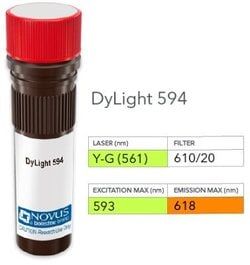Macrophage and Histiocytoma Marker Antibody (D11) - IHC-Prediluted, Novus Biologicals™
Manufacturer: Novus Biologicals
Select a Size
| Pack Size | SKU | Availability | Price |
|---|---|---|---|
| Each of 1 | NBP248138-Each-of-1 | In Stock | ₹ 46,636.00 |
NBP248138 - Each of 1
In Stock
Quantity
1
Base Price: ₹ 46,636.00
GST (18%): ₹ 8,394.48
Total Price: ₹ 55,030.48
Antigen
Macrophage and Histiocytoma Marker
Classification
Monoclonal
Conjugate
Unconjugated
Formulation
10 mM PBS with 0.05% Sodium Azide
Immunogen
Membrane preparation from human hepatocytes
Quantity
7 mL
Primary or Secondary
Primary
Target Species
Human, Mouse (Negative), Porcine (Negative), Rat (Negative)
Form
Purified
Applications
Immunohistochemistry (Paraffin)
Clone
D11
Dilution
Immunohistochemistry-Paraffin
Host Species
Mouse
Purification Method
Protein A or G purified
Regulatory Status
RUO
Test Specificity
In Western blotting, it detects an antigen of 125kDa in human liver and 135kDa in tumors of histiocytic origin. Comparative study of this monoclonal antibody and a standard CD68 monoclonal antibody showed that their antigens are different. Its antigen in all macrophage types studied is located on the plasma membrane and within cytoplasmic structures including lysosomes. This monoclonal antibody shows a restricted reactivity to cells of the monocyte/macrophage system. It specifically reacts with blood monocytes and stains resident macrophages in a wide variety of human tissues. This monoclonal antibody does not stain antigen-presenting cells, e.g., Langerhans cells. Reportedly, its reactivity is restricted to histiocytes and macrophages.
Content And Storage
Store at 4C.
Isotype
IgG1 κ
Description
- Macrophage and Histiocytoma Marker Monoclonal specifically detects Macrophage and Histiocytoma Marker in Human, Mouse (Negative), Porcine (Negative), Rat (Negative) samples
- It is validated for Immunohistochemistry, Immunohistochemistry-Paraffin.


